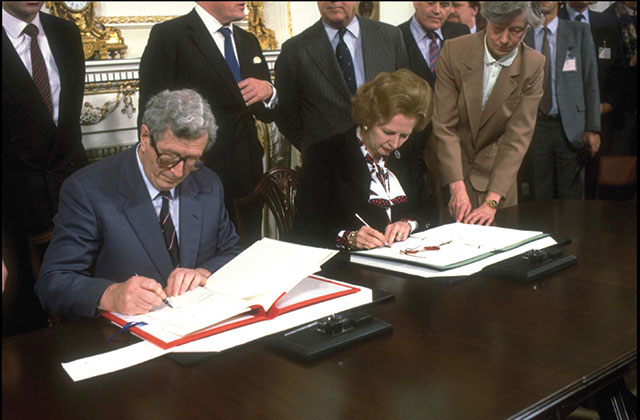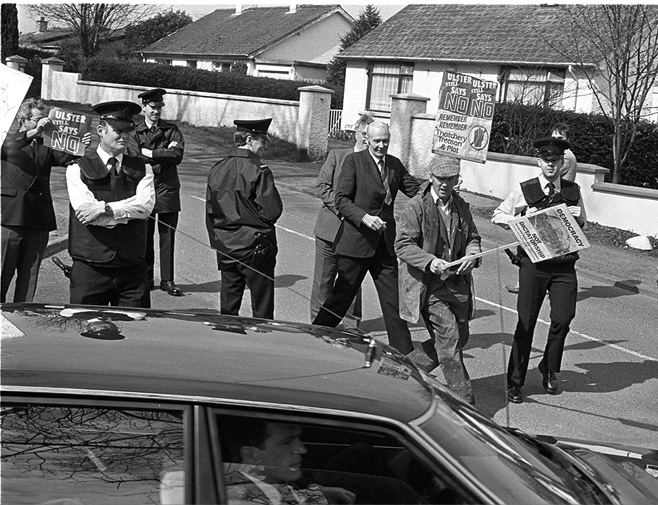State papers


The latest tranche of state papers released by PRONI, spanning across three decades, reveal a myriad of comtemporary concerns and complexities for the British Government’s Northern Ireland Office and the Irish Government’s Department of Foreign Affairs.
The most recently opened files, extending from 1974 to 1990, incorporate a vast array of topics, officials and specific incidents.
One notable example is an NIO memo from April 1986. As a response to the incensed unionist reaction and subsequent violence which was unleashed in the aftermath of the Anglo Irish Agreement, then head of the Northern Ireland Civil Service Kenneth Bloomfield suggested: “One alternative would be to look to a long campaign of violence and attrition – doing nothing and bringing home to the unionists that this sort of action just does not pay.” A move which he regarded as being entirely logical.
A concern with the public perception of the Ulster Defence Regiment features regularly across the files. In 1989, the British Army’s General Officer Commanding Northern Ireland John Waters expressed his opposition to the Irish Government’s suggestion of the UDR units operating outside of their own locale. Such a proposal, he argued would “be a gift from heaven for the IRA” and, he added, “I think such a measure would affect the Regiment’s morale and cause Protestant uproar.”
The documents also reveal a debate within British Government circles surrounding a potential reintroduction of capital punishment for treason offences in 1990. An internal NIO memo highlighted two concerns regarding such a proposal. The utilisation of Diplock courts proved problematic in this regard. “The idea that the judge – already burdened by having to sit alone and already a target for terrorist attack – should, in addition, decide between life and death is surely unacceptable.”
Simultaneously, the NIO considered that, while the unionist community may have largely welcomed a restoration of capital punishment, “the vast majority of the Catholic community would be strongly opposed.” The memo adds: “There would be significant and extensive disaffection… this might prompt public disorder which would have serious resource implications for the security forces.”
In October 1989, one hint of improving Anglo-Irish relations is a discussion between NIO officials as to the feasibility of Secretary of State for Northern Ireland Peter Brooke attending an appropriate GAA match. Brooke had indicated to his personal secretary, SJ Leach, that “if a volunteer is required to watch hurling or Gaelic football, he would be happy to undertake this role, if only out of curiosity.”
Leach asserted that there could be “considerable political and symbolic benefit in attending a hurling, Gaelic football or even a camogie match”. However, given the GAA’s now-rescinded exclusion on British security force personnel from membership (Rule 21), AW Stephens, a senior civil servant, advised that such an attendance could: “cause considerable offence to the police and army which would outweigh any political benefit.”

In the same month, 28 UDR members were arrested as part of the first of the Stevens Inquiries. RUC Chief Constable Hugh Annesley had initiated the investigation into suspected collusion between loyalists and British security forces. Then Regimental Colonel Dennis Faulkner (brother of Brain Faulkner) outlined his anger at the manner in which the arrests occurred to Secretary of State Brooke, arguing that “if there were malefactors in the Regiment, they should be vigorously weeded out”. Adding that the arrests were “provocative” and “little short of a disgrace”, Faulkner added that they “carried the implication that UDR soldiers were on a par with terrorists”. This, he contended, was “designed to have an effect on Anglo-Irish relations”, by placating the Dublin Government.
Dublin papers
Irish state papers also reveal some curious commentary.
In a meeting at the Conference Centre in London between British Prime Minister Margaret Thatcher and then Taoiseach Garrett FitzGerald prior to Christmas 1986, cross-border security and cooperation was a central tenet of discussion.
Emphasising the benefits derived by An Garda Síochána from cooperation with the RUC, FitzGerald noted: “They are passing on the benefits of experience and, in fact, this is probably improving the way the Gardaí work. Both forces have the next to impossible border to watch.” To which Thatcher conceded: “Yes. We got it wrong in 1921.”
In reference to particular regions in the South, the British Prime Minister claimed, “[The PIRA] get safe houses there and can live in the community.” Responding, the Taoiseach tersely highlighted: “Many people from the North come down to the South and live there. We have 200 people from the North in our jails. You can have them back any time you want!”
“I don’t want them. You can have all the nationalists in the North if you like!” retorted Thatcher.
Confiding in the Taoiseach, she stated: “I do feel very depressed at times about the whole situation. The violence has not been defeated. The SDLP have not done what we were expecting them to do.”
The hand written minutes, recorded by Secretary to the Irish Government Dermot Nally, a veteran of several meetings between the British leader and successive Irish premiers, make reference to Thatcher’s election speculations and “rather a wistful reference to whether she could continue, in all seriousness, to send young men to their deaths in Northern Ireland”.
In April 1986, David Barry from the Irish Department of Foreign Affairs attended a meeting at the home of eminent Belfast solicitor, the late PJ McGrory. His account of the engagement observes that McGrory, who legally represented several prominent republicans, “has never taken seriously the idea that [Gerry] Adams is the Chief of Staff of the IRA… he is satisfied Adams has a remarkably strong influence on the Republican movement.”
On the Anglo-Irish Agreement, McGrory outlined: “The Provos would allow the Agreement to disintegrate by itself but not try to hasten its demise to any significant extent.”
The report also remarks: “[The PIRA] expect the Taoiseach and Mrs Thatcher to make some concessions on the Agreement which will appease unionists and alienate nationalists. They will stand in the wings ready to reap the benefits when the time comes.”
On the other hand, a document detailing a meeting between Bishop Cathal Daly and the Irish Head of the Anglo-Irish Secretariat, David Donoghue, records the Bishop’s belief that the Agreement represented a final opportunity to rescue society from anarchy. Daly reportedly stressed: “The Provos have been hit hard by the Agreement – it is clear from their defensive attitude towards it that they feel threatened by it.”
“The Agreement, if honoured by the British, offers the best, and indeed the only, chance of defeating the Provos,” he added.





